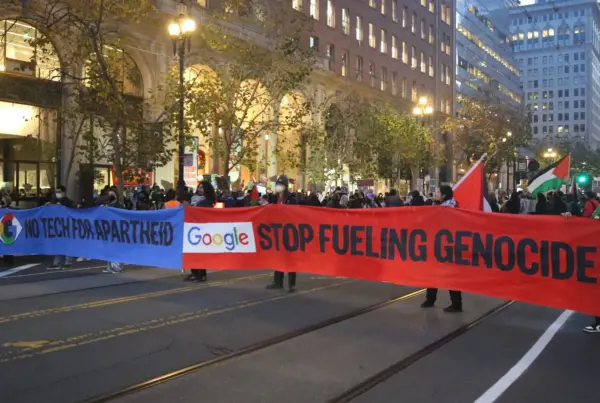In October, American retail giants Kroger and Albertsons announced plans for a nearly USD 25 billion merger. If approved by regulators, the deal could be devastating for shoppers and in-store staff. The merger will add to the pressure on consumer prices caused by rising inflation, the ongoing US diesel shortage and the looming nationwide rail strike.
Allison Westervelt, 7 December 2022
In what has the potential to be one of the biggest deals in US history, in October two of the nation’s largest supermarket chains – Kroger and Albertsons – announced merger plans. While the USD 24.6 billion deal is not yet set in stone, if approved consumers will likely face higher grocery prices and less options.
Kroger and Albertsons own well-known brands such as Safeway, Pick’n Save, City Market, and Shaw’s. If the two merge, it would give the combined company control of nearly 5000 shops, or almost 20 percent of the American grocery market, making its market share second only to Walmart’s.
Kroger and Albertsons employ primarily union workers. This gives employees better leverage to negotiate for higher wages and better benefits. Analysts suspect that Kroger’s merger goal is to increase its competitive advantage against non-union grocers like Walmart, Amazon, and Costco as well as the quickly growing, no-frills German grocery chain Aldi.
In Kroger’s press release announcing the acquisition of Albertsons, the retail behemoth promised that their greater size and bargaining power will allow them to lower prices for shoppers and pay workers more. However, experts warn that this has not happened when grocery chains have merged in the past, and consumer advocates are concerned that the company would redirect profit increases to shareholders.
Antitrust advocates claim Kroger’s acquisition of Albertsons would drive out competition and concentrate market power among the larger chain, thus allowing the company to increase prices. Indeed, a study published by the Federal Trade Commission (FTC) in 2012 that analyzed grocery mergers found that although prices decrease in unconcentrated markets (meaning rural areas where there are sparse grocery options), mergers in concentrated markets more often lead to price hikes of 2 percent or more. Furthermore, as Kroger and Albertsons shops overlap in many parts of the US, once merged the grocery giant would probably close stores, eliminate jobs, and sell other stores to smaller grocery chains – meaning less jobs for workers and less options for consumers.
The announcement of the potential merger is coming as food prices are already soaring. As US sanctions on Russian gas imports continue, US refineries struggle to keep up with demand. The US historic diesel shortage is exacerbating the pressure on consumer prices. Another worrying development pressuring US consumer prices is the looming US rail strike, which would take 500000 trucks off the road. According to the Association of American Railroads the nationwide strike could cost the US economy over USD 2 billion a day.
According to the US Department of Agriculture (USDA), the cost of food has risen 11.2 percent from September 2021 to September 2022, and more than 13 million families were food insecure in 2021. The USDA’s website states that over 34 million people in the US, including 9 million children, are food insecure.
Additionally, both Kroger and Albertsons have received accusations of unfair labor practices and poor working conditions for store workers. In the past year, thousands of Albertsons and Kroger employees have pressed fellow workers to strike for better wages and health benefits in states like Colorado, California, Louisiana, and Texas. During the pandemic, store workers received a “hero pay” benefit of an additional USD 2 per hour for only three months while executive bonuses skyrocketed. As many of the country’s poorest paying jobs are in the food industry, this deal could mean more exploitation of workers.
What’s more, both Kroger and Albertsons were accused of price gouging in the earliest stages of the COVID-19 pandemic. Lawsuits filed in Texas and California allege that grocery stores including Kroger and Albertsons inflated the price of eggs by nearly three times during March 2020. As Kroger and Albertsons’ prices continued to increase throughout 2021, executive leadership blamed rising costs and inflation but reassured shareholders that the business would profit. Kroger CEO Rodney McMullen infamously said on a call with investors in June 2021 that “a little bit of inflation is always good for our business” – implying that consumers were bearing the brunt of price increases.
Senator Bernie Sanders (I-Vt.), Senator Elizabeth Warren (D-Mass.) and Representative Jan Schakowsky (D-Ill.) are only a few of the many US politicians who oppose the deal. In a letter to the Federal Trade Commission (FTC) Chair Lina Khan, the lawmakers expressed strong opposition to Kroger’s proposed acquisition of Albertsons. “Given the parties’ records of raising food prices for consumers and cutting benefits to workers to pad their own profits… the FTC should oppose this proposed merger,” wrote the politicians. “Kroger’s and Albertsons’ histories of aggressive profiteering during the pandemic present a dangerous roadmap for how a larger and more powerful company would act if this acquisition were allowed to proceed…The FTC, when evaluating the potential market and consumer effects of the Kroger-Albertsons acquisition, should closely consider both companies’ history of monopoly, labor, and consumer abuses, and whether this acquisition would exacerbate these abuses for American families,” the letter continues.
While workers and consumers will bear any negative consequences of the merger, investors stand to make billions. Cerberus, the private equity firm that owns approximately one third of Albertsons, could make more than USD 7 billion if it is sold to Kroger. Furthermore, Albertsons tried to reward Cerberus with a USD 4 billion “special dividend” for shareholders, which critics liken to “looting” the company as it would leave Albertsons so weakened that it would be difficult for antitrust regulators to refuse the merger with Kroger. The Albertson executive team is set to receive a combined payout of about USD 97 million.
As it stands now the merger will harm average Americans with layoffs and consumer price hikes. Everyday essentials will cost more and food insecurity will rise. It remains to be seen if state and federal regulators will step in to protect consumer rights and uphold competition regulation, or if this mega-merger will be another nail in the coffin for small businesses and neighborhoods.







